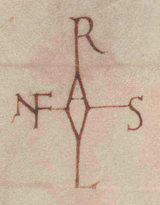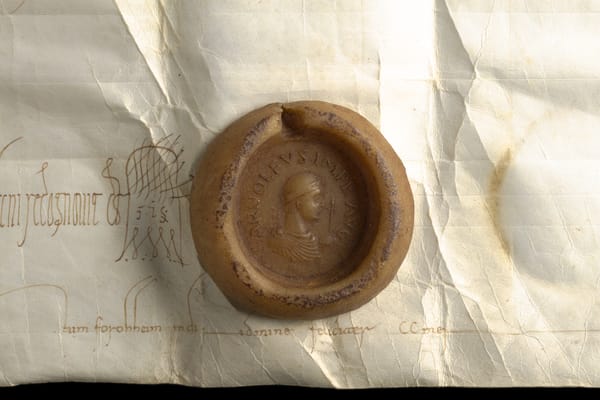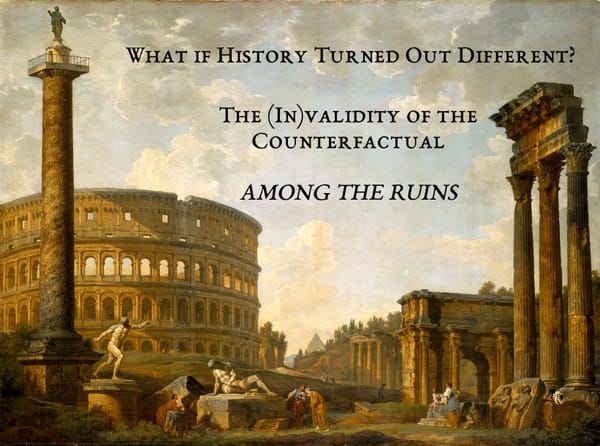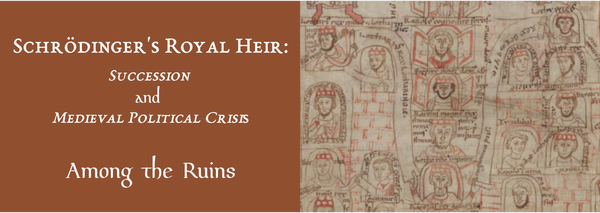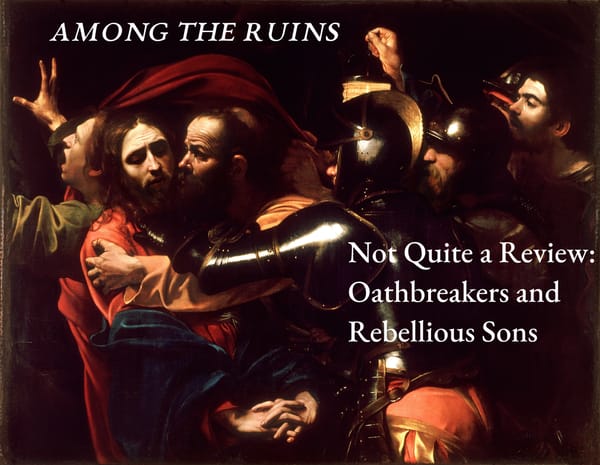What Does It Mean To Finish A PhD? Some Reflections
No PhD is easy, I wanted to offer some thoughts on my experience, my struggle with depression, and the value of a PhD in the Internet Age.

My emotions have been a bit all over the place recently, in part because actually finishing my PhD often felt impossible. For a long time I have wanted to be a historian, and it took almost 10 years, but on April 10th, 2025 I defended my PhD. I am publishing this post on May 16th, a day before graduation.
Nothing about a PhD is supposed to be easy, but nothing prepared me for just how difficult it would be. My grandfather once told me that nothing in life was too hard, only difficult, and I have often thought about that as I continued to push on through my PhD. Ask any humanities PhD student and they will tell you that the complete collapse of the academic job market, and potentially the academic world itself, is not a great motivator to finish. Yet in the end I completed this for myself, as an intellectual journey that only I could embark on, and only I could finish. Every person’s experience is different, which makes generalizing about PhD programs very difficult, but there are similarities. Of course, the pay is often way too low, while the expectations for graduate students continues to increase. This, alongside inbuilt biases towards “prestige” and “potential” from select schools, creates a widening gap within the academic world. Someone with more money and resources has an easier time publishing, getting grants, etc. during their PhD than someone who needs to continue to shuffle through a revolving carousel of part time positions and unstable TA work. This has little to do with the quality of the student or the quality of their scholarship, and more to do with the unequal nature of how academics love hierarchy and prestige. A case in point: early in my graduate career I attended a conference to give a paper. During my introduction as speaker people seemed relatively disinterested, but when the person introducing me mentioned I did an MPhil at the University of Cambridge, I remember noticing people sitting up a bit straighter.
I grew up in a working-class family, and we were quite poor at times. This left a lasting impression on me, and arriving at university only heightened that this difference mattered. When we protested for a tuition freeze I was told by kids far wealthier than I that “if you can’t afford it, leave.” Meanwhile I would overhear people complain about taking the bus (that is for the poors) or that their parents “only” gave them $500 a month to blow on fun things. Even among the leftists this wealth was deeply embedded, one avowed leftist who studied queer philosophy called me a sell-out for needing to work to pay for rent and food. Whether this was intended to be ironic or not, it further entrenched my belief that being poor made me different. Academic culture depends on wealth in a lot of ways, from manners at professional dinners, to foreign languages, to travel experiences, the list goes on where soft skills available to the wealthy are harder to come by if you are poor.
But this is all a digression from the PhD itself, which is an undertaking unlike anything else I have ever done. People occasionally ask if I would recommend a PhD to someone, and realistically the answer is no, I wouldn’t. That is not to say I regret doing a PhD. On the contrary, it has been my dream for a long time. I remember hearing when I was younger that you got paid to do a PhD and thinking it was marvelous that someone could be paid to think. Naturally, I didn’t understand what that all entailed, but the idea stuck with me. Over the years that idea evolved in my own mind. It was not simply getting paid to think, but using your mind to produce something novel, to add something to a specific part of human knowledge. To me that is the real captivating part of the process: while others may have studied this topic, I am presenting something (hopefully) new and compelling. There is a sense of permanence there, in a moment when everything seems to be reduced to ephemeral content, constantly disappearing into the void of algorithms. Instead, the dissertation is an argument for extended reflection, writing, and existing. It pushed me to new lengths to create arguments, polish my writing, and establish a scholarly profile.
In that way doing a PhD was a profoundly personal endeavor. It taught me to be a better writer, a more nuanced and complete thinker, but also a more outgoing and confident person. The graduate student crippled with imposter syndrome was certainly a valid image for me at various points. Even now doubts often creep in. But at the same time my experience has caused me to be more confident, more assertive in my own ideas. It was at Leeds in 2023 that I stood in a room filled with a veritable whos-who of early medieval historians, and was terrified about how my work would be received. As you might expect, it was received well, and my worries were largely the result of my own insecurities more than a real defect in my work. It was important, however, in helping me get more comfortable with presenting myself to others and being confident in myself. In a lot of ways the process of doing a PhD has taught me the ability to push forward even when I am unsure of my own abilities. Instead of being paralyzed by that fear, I now try to just put in the work, learn the skill, submit the application. I've heard it said that PhDs are made through sheer will, and there is some truth to that. Getting to the end was not always a matter of my technical abilities as a historian or a writer, but simply showing up, over and over, year after year, and never giving up no matter how depressed I was.
Make no mistake, there were many times over the years when the depression almost caused me to give up. Depression is a brutal, devastating challenge that I have struggled with most of my life and in academia, as elsewhere, mental health issues are often stigmatized. There were days when I did not believe in myself, or that there was no future for me. Many days spent thinking that if I died then it wouldn't matter, because there was not a point to living. A community was essential to getting out of particularly intense bouts of depression, I was blessed with great friends and colleagues in the program. In particular one friend who in a deep moment of torment promised that we both would finish the PhD together. Sometimes finishing requires someone else to believe in you when you don’t believe in yourself. As such I was also fortunate to have external people, graduate students at other universities and faculty elsewhere who either lent words of encouragement, read drafts, or kindly sat and discussed my project in a convivial and joyful way. A lot of it was simply feeling like I belonged to a community that valued my presence. I know this isn't a universal experience, and the academic world can be awful, but in my corner of the field people were very welcoming and kind.
If nothing else, I am proof that these obstacles can be overcome, at least a bit. Perhaps there is another version of me somewhere out there that was wealthier or less depressed who had more time to publish articles, pursue grants, etc. during my PhD. The real trick of modern graduate education, however, is to convince us that any of my failings are because I just didn’t “grind” hard enough. In reality, there is not enough jobs for anyone, and the pressures placed on graduate students is drastically more than in the past. That isn’t good for anyone, and isn’t sustainable if we want the humanities to continue. As I write this, I have $200 in my bank account, wondering what kind of job and what kind of future is possible without giving up on my dream. Speaking of, can I interest you in subscribing (or sharing)?
If I had a word of advice to others, it is not to give up on actually enjoying the work. As Ernst Dümmler wrote in his 1852 dissertation on Arnulf, no one does this for fame or prestige. Instead, we do this because we have a deep and abiding sense of the value of humanistic inquiry. At least, if you are doing a PhD just because, I wouldn’t recommend that. Holding onto that sense of wonder, curiosity, and excitement can be hard when slogging through deadlines, funding challenges, and bureaucratic nightmares of the university. I'm not saying you need to love every moment, but keep sight of why your project fascinates you.
A PhD is a monument to a style of thinking and learning that is being rapidly obliterated from society. It is a deep investment in a person's mind that AI, and the various "efficiency" programs that came before it, cannot replace. It is also a radical argument against "content" and internet ephemera, because a PhD, in theory, is meant to advance the field. It is not meant to be engaged with simply as something that is cool or "interesting" but prompts new ideas and new questions. If it does eventually become replaced by a new way of thinking, then it has served a purpose in creating progress in a given field. That is drastically different from much online content, which has no real permanence, but is meant to be absent-mindedly scrolled by.
Brevity is rarely the strength of the historian, and this has already been more winding than I hoped. Hopefully I can use this site as a way of sharing my own and other's research. Regardless, in the end I did the PhD for one person alone: me. No matter what happens that is part of who I am and what I have done, which is perhaps the most important point of this entire adventure. I am reminded of the end of John Bunyan's The Pilgrim's Progress (1678) when Christian reaches Heaven and asks what comes next:
You must there receive the comfort of all your toil, and have joy for all your sorrow; you must reap what you have sown, even the fruit of all your Prayers and Tears. (Harvard Classics Edition, 1909, p. 164)
I have plenty more to do, I am certainly not in Heaven. But there is a sense of unloading, of relief, of having crossed over to a different and new chapter of my life. I hope you will come along with me on the next chapter.
Thanks for reading Among the Ruins! If you haven’t subscribed, please do so below and you can do your part in defeating the algorithm!

